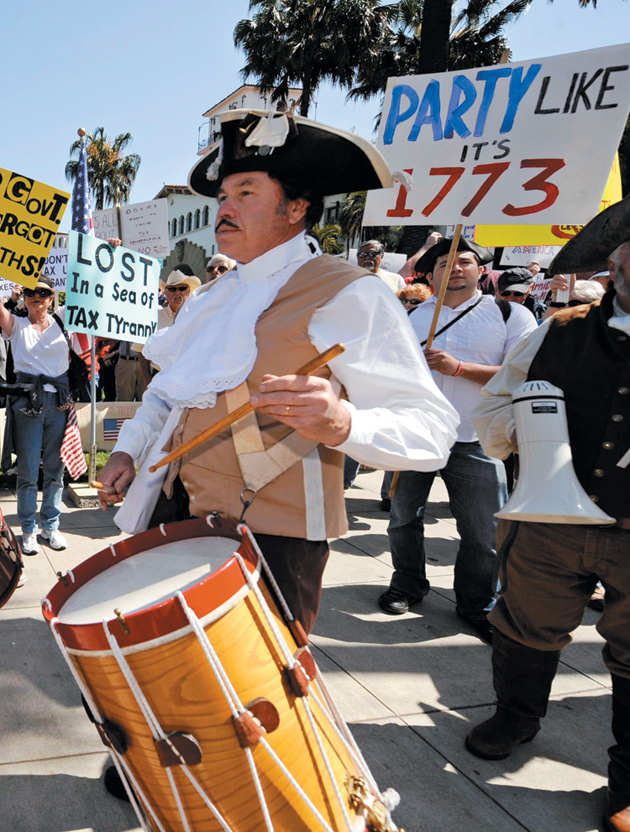In response to:
The Tea Party Jacobins from the May 27, 2010 issue
To the Editors:
I agree with so much that Mark Lilla says about American politics and the Tea Party phenomenon that it seems churlish to take issue with his evocation of the Jacobins for comparison [“The Tea Party Jacobins,” NYR, May 27]. Yet I think his analogy is misleading and inappropriate.
The Jacobins in the French Revolution were not homogeneous. There were the mindless and the meddlesome as well as those who turned to direct action or clandestine activity. There were the quiet and complacent trimmers who voted with the leadership, and terrorists both sadistic and reluctant. The Jacobin faction in the Convention Assembly was fragmented. In the mainstream of Jacobinism, so to speak, are the famous names, including Robespierre, Saint-Just, Danton, most of the members of the revolutionary government, and the Committee of Public Safety. Here we find a political faction driven and led by ideology. Robespierre’s hold over his contemporaries was rhetorical and ideological.
Once they had power the Jacobins implemented a strong centralized state. They wielded, during the year of their dominance (roughly July 1793 to July 1794), more power and control than any French king. Individualism was not tolerated. The Committee of Public Safety purged the Paris Commune, hounded splinter groups, destroyed independent terrorists, and bureaucratized and centralized the Terror. They believed that the right political line trumped the experts yet they gave them a lot of power. The Committee of Public Safety was a remarkable experiment, dividing the tasks of government among those who knew what they were doing. Lazare Carnot, a soldier, military engineer, and mathematician who became “the organizer of victory,” is the best example.
I think Mark Lilla used the Jacobin analogy to suggest a kind of political fanaticism determined to destroy the ancien régime without regard for the consequences. This is not what the Jacobins were or what they did. Robespierre’s Republic of Virtue may have been a murderous utopia, but it was an ideology and an idea with a long European pedigree of repressive utopian visions.
The so-called enragés (crazies) of the French Revolution are a better analogy. They attacked the Jacobin government, thought they and their friends could run everything better (including the war), had no clear leadership or organization, accepted no collective discipline, were ferociously individualistic, and beyond much rhetorical posturing had few ideas other than resentment, distrust, and anger. The Jacobins were called “anarchists” by their enemies, but it is the enragés who would be most at home in the Tea Party get-togethers.
David Jordan
Distinguished Professor of French History, Emeritus
University of Illinois at Chicago
Chicago, Illinois
To the Editors:
Mark Lilla provides an interesting analysis of the Tea Party movement, with a number of useful insights. His analysis, however, misses much of importance and danger in the movement because he relies on the notion of radical individualism. Some social scientists, such as Robert Bellah and Robert Putnam, have used this notion to broadly and negatively stereotype American society during the last two or three decades of the twentieth century. Conservative social commentators with political agendas—such as Gertrude Himmelfarb and William Bennett—have accused liberals, academics, and so-called elites of causing moral decay in society owing to their radical individualism. Professor Lilla invokes individualism to characterize the Tea Party and to link this movement to social and political movements of the 1960s.
One-dimensional portrayals like individualism or its opposite rarely capture peoples or movements because they are just that, one-dimensional. The political movements of the 1960s were primarily about stopping the killing in Vietnam and promoting justice and equality through civil rights. These are hardly the makings of radical individualism. Members of the hippie movement did emphasize “doing your own thing,” but they also emphasized communal living. More apt associations of the Tea Party to the 1960s are to segregationist governors George Wallace of Alabama and Ross Barnett of Mississippi.
To be sure, Tea Partiers and other conservatives want to be left alone—on some matters (who doesn’t). To be sure, they are against big government—in some realms. However, to view them as individualists is to miss the most disturbing and potentially dangerous elements of the movement: namely, that they are in favor of giving great authority to those on their side of politics and worldviews. They are ready to segregate, marginalize, and even dismiss those with whom they disagree, whom they regard as different, and as not true Americans. They are for repressive government even if they refuse to call it big government.
As Professor Lilla states, many Tea Party supporters want certain educated elites to stop controlling their lives. But they do want others whom they would trust to run the government (say Sarah Palin) to guide their lives and everyone else’s. They seek authoritarian control over those whom they do not consider part of the mainstream or sufficiently patriotic. The acceptance of Bush and Cheney’s claims to unbounded executive power and all that comes with it, and endorsement of Arizona’s recently enacted immigration law, are examples of embracing big and repressive government. Some other examples include favoring laws regarding end-of-life decisions, tougher prison sentencing, greater police powers, and support for a bigger and more costly military. Professor Lilla predicts that the Tea Party will dissolve because its members are ideologically allergic to hierarchy of any kind. Accepting instead that they are highly wedded to hierarchy and an associated xenophobia means that we need to be very vigilant in these difficult economic times and work hard toward the dissolution Professor Lilla predicts.
Advertisement
Elliot Turiel
Jerome A. Hutto Professor of Education
Co-Director, Institute of Human Development
University of California
Berkeley, California
To the Editors:
Mark Lilla reminds us that Tea Party members are “overwhelmingly white, older, educated, and with higher-than-average incomes.” This is helpful, and for those of us anxious to see the Tea Party depart into the dustbins of history, hopeful. But I have a problem with Mr. Lilla’s depiction of the Sixties as exclusively “anarchistic,” devoted to issues of private autonomy, and thus continuous with rather than in opposition to the “radical individualism” that the Tea Party purports to represent.
The Sixties of which I was a part celebrated the integration of the armed forces by presidential order, and called on the national government to send federal marshals to Mississippi to forestall events like the murder of Chaney, Goodman, and Schwerner. That Sixties forthrightly opposed United States imperialism; it is a little- remembered fact that the Student Nonviolent Coordinating Committee (SNCC) endorsed draft resistance a year before the Students for a Democratic Society (SDS) did likewise. The Sixties of which I was a part also created institutions like Headstart and the National Legal Services Corporation that married federal funding with decentralized administration. And the first demonstration against the Vietnam War in Washington, D.C., in April 1965 heard Paul Potter, president of SDS, say that wars waged by the United States were caused by a system of institutions, and that we needed to “name that system” and abolish it.
These anti-imperialist, anti-capitalist Sixties still exist in the hearts and minds of many who lived through them. Early in 2003 a number of trade unionists convened in Chicago a new organization to be called US Labor Against the War. Two African-American colleagues from Youngstown and I journeyed thither by Greyhound bus. It transpired that the meeting was to be held in the hall of a local chapter of the International Brotherhood of Teamsters, an entity not known for unpatriotic sentiments. Bemused, I sought out two shop stewards and asked them, “How come?” They answered, “It was the Vietnam vets. They hit the mike at the local union meeting and told us they had seen this movie before.”
Let’s not conceptualize the Sixties merely as a forerunner of the Tea Party. What we then called the Movement overlapped with, but was distinct from, what Mr. Lilla calls “the cultural revolution of the Sixties.” The ethos of that movement is a legacy that can be invested anew.
Staughton Lynd
Niles, Ohio
Mark Lilla replies:
Professor Jordan is absolutely right that the Tea Party movement more resembles the apocalyptic enragés of the Revolution than the chillingly methodical Jacobins. But he seems to have missed the irony of my calling them “anti-political Jacobins,” which in a sense is exactly what the enragés were: exterminating angels bred of Jacobinism, not builders of a utopian society.
As a historian of France, Professor Jordan will also recall that the latest group to call themselves les enragés were the radical students of Nanterre during the events of May ’68 in Paris. Which brings us to Professor Turiel and Mr. Lynd. Mr. Lynd expresses my sentiments exactly when he says that the civil rights and antiwar movements can be distinguished from the cultural revolution of the Sixties. (I am not sure Professor Turiel agrees.) In fact, I insist on the point: the cultural revolution transformed all Western societies, overturning patriarchy in the family, giving women and gays control over their bodies, challenging the authority of teachers, ending censorship, weakening traditional churches—in a word, giving individuals more autonomy in more areas of life.
The political movements of the time differed from country to country but the cultural movements were the same, and their effects have been far more significant. The SDS may have “named the system,” but it did not destroy it or even come close. Nor did Sixties political movements elsewhere in the West.
It’s about time we were less touchy about the Sixties and put their paradoxical legacy in historical and especially international perspective. I’ve just returned from a month in China, where, given the one-child policy, urban dislocation, rising inequality, and the ubiquity of the Internet, people are now experiencing and worrying about the atomization we have been experiencing for half a century. Their worries should be our worries.
Advertisement
This Issue
August 19, 2010
The Crisis & the Euro




